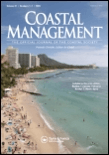
COASTAL MANAGEMENT
Scope & Guideline
Innovating practices for resilient coastal management.
Introduction
Aims and Scopes
- Integrated Coastal Zone Management (ICZM):
The journal focuses on methodologies and frameworks for ICZM, promoting collaborative approaches that balance ecological integrity with human development needs. - Marine Ecosystem Health and Resilience:
Research on maintaining and enhancing the health of marine ecosystems, including studies on biodiversity, habitat conservation, and the impacts of climate change on coastal environments. - Socioeconomic Impacts of Coastal Management:
Emphasizes the social and economic dimensions of coastal management, including community engagement, livelihood assessments, and the evaluation of tourism impacts. - Policy and Governance in Coastal Management:
Examination of policy frameworks, governance structures, and legal aspects related to coastal management, including regional and international cooperation. - Sustainable Fisheries and Aquaculture:
Focuses on sustainable practices in fisheries and aquaculture, assessing fishery management strategies and their implications for both ecosystems and local communities.
Trending and Emerging
- Climate Change Adaptation Strategies:
An increasing focus on adaptive strategies for coastal communities in response to climate change, including vulnerability assessments and resilience-building initiatives. - Transboundary Environmental Issues:
Growing attention to transboundary challenges in coastal management, particularly in regions like the Arafura and Timor Seas, indicating a collaborative approach to shared environmental threats. - Cultural and Behavioral Aspects of Coastal Management:
Emerging themes around cultural shifts and community behavior regarding coastal resource management, emphasizing the importance of public engagement and education. - Economic Valuation of Coastal Ecosystems:
A trend towards assessing the economic value of coastal ecosystems and their services, which supports arguments for sustainable management and investment in conservation. - Integration of Technology in Coastal Monitoring:
Increased interest in utilizing technology for monitoring coastal ecosystems, including remote sensing and data analytics, to inform management decisions.
Declining or Waning
- Traditional Fisheries Management Approaches:
There is a noticeable decrease in papers focusing solely on traditional fisheries management, as the discourse shifts towards more integrated approaches that consider ecological and socioeconomic factors. - Single-Dimensional Environmental Assessments:
Papers that examine coastal environments through a narrow lens of environmental assessment without integrating social and economic contexts are becoming less common. - Historical Coastal Practices:
Research concentrating on historical practices without a clear link to contemporary management challenges or sustainability is waning, reflecting a trend towards more forward-looking studies.
Similar Journals

Maritime Studies
Bridging Disciplines in Maritime ResearchMaritime Studies is a premier journal published by Springer Heidelberg, focusing on interdisciplinary research in the fields of aquatic sciences, development, geography, and environmental management. With an ISSN of 1872-7859 and an E-ISSN of 2212-9790, the journal serves as a critical platform for the dissemination of innovative studies that advance our understanding of maritime environments and their socio-economic implications. The journal boasts an impressive Q2 ranking across multiple categories, including Aquatic Science and Geography, underscoring its significance in the academic community. With a commitment to fostering dialogue on maritime policy, management, and technological advancements, Maritime Studies is essential reading for researchers, policymakers, and students dedicated to promoting sustainable practices in ocean and waterway resource management. As this journal converges between 2012 to 2024, it continues to uphold the highest academic standards, facilitating impactful research that shapes the discourse in marine studies and beyond.

GEO-MARINE LETTERS
Advancing Knowledge in Marine and Geological ResearchGEO-MARINE LETTERS, published by Springer, is a prestigious academic journal that has been a pivotal platform for the dissemination of innovative research in the fields of Earth and Planetary Sciences, Oceanography, Environmental Science, and Geotechnical Engineering since its inception in 1981. With an E-ISSN of 1432-1157, this journal has established itself in the Q2 quartile across multiple categories in 2023, indicating its influential position within the scientific community, as reflected by its Scopus rankings. While it currently does not offer an open access option, its rigorous peer-review process ensures the publication of high-quality research that contributes significantly to advancing our understanding of marine and geological sciences. Researchers, professionals, and students alike will benefit from the diverse scope of studies featured in GEO-MARINE LETTERS, making it an essential resource for those engaged in environmental and marine research. Situated in Germany, the journal's commitment to excellence continues to shape critical discussions and innovations in the field.
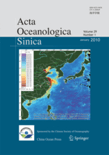
ACTA OCEANOLOGICA SINICA
Illuminating the Complexities of Aquatic EnvironmentsACTA OCEANOLOGICA SINICA, published by SPRINGER, stands as a significant voice in the fields of Aquatic Science and Oceanography, contributing vital research and insights since its inception in 1985. With an ISSN of 0253-505X and an E-ISSN of 1869-1099, this journal maintains a strong international focus, delivering high-quality peer-reviewed articles that address pressing marine and freshwater environmental issues. Although it operates under a subscription model, its Q3 ranking in both Aquatic Science and Oceanography demonstrates its solid standing within Scopus, placing it in the 48th and 44th percentiles respectively. The journal aims to foster knowledge exchange and collaboration among researchers, professionals, and students by providing a platform for innovative studies and comprehensive reviews. With a dedicated editorial board and a commitment to advancing scientific understanding, ACTA OCEANOLOGICA SINICA serves as an essential resource for anyone engaged in the study of oceanographic phenomena and aquatic ecosystems.
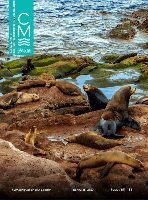
CIENCIAS MARINAS
Navigating the Future of Oceanic StudiesCIENCIAS MARINAS, an influential journal in the field of Aquatic Sciences, is published by the Instituto de Investigaciones Oceanológicas of the Universidad Autónoma de Baja California. Established as an open access platform since 2006, it aims to disseminate original research and critical reviews that contribute to the advancement of marine science. With a commitment to fostering scholarly dialogue, CIENCIAS MARINAS serves as a vital resource for academics, researchers, and practitioners interested in the ecological dynamics and biological processes of aquatic environments. Although currently ranked in the fourth quartile in Aquatic Science by Scopus, the journal remains dedicated to increasing its visibility and impact within the research community. Housed in Mexico, it offers a regional perspective that underscores the importance of coastal and oceanic research, making it an essential avenue for exploring marine biodiversity and conservation efforts. By engaging with this journal, readers can stay abreast of the latest developments and contribute to the growing body of knowledge in marine sciences.

Research in Marine Sciences
Exploring the depths of marine science for global impact.Research in Marine Sciences, ISSN 2538-5542, is a leading journal published by ARMAN DARYA INC, specializing in the dynamic and interdisciplinary field of marine science. With a commitment to advancing knowledge in areas such as marine ecology, oceanography, and marine conservation, this journal provides a collaborative platform for researchers, professionals, and students to disseminate their findings. Although it operates under a traditional subscription model, the journal ensures that the latest research is accessible to a wide audience, promoting the understanding of marine environments crucial for biodiversity and sustainability. The journal aims to bridge the gap between theoretical research and practical applications, emphasizing the need for rigorous studies that address pressing marine issues in a rapidly changing world. By contributing to the body of literature in marine sciences, Research in Marine Sciences plays a vital role in shaping the future of marine research and policy-making.
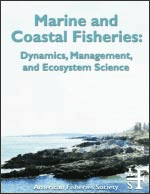
Marine and Coastal Fisheries
Innovating fisheries management for a sustainable tomorrow.Marine and Coastal Fisheries, published by Wiley, is a leading open access journal that has been dedicated to advancing the field of fisheries science since its inception in 2009. With an esteemed Q1 ranking in Aquatic Science and a Q2 ranking in Ecology, Evolution, Behavior and Systematics as of 2023, the journal actively contributes to the understanding and management of marine and coastal ecosystems.
This journal serves a diverse audience ranging from researchers and practitioners to students, providing a platform for high-quality peer-reviewed articles that address contemporary challenges in fisheries management and conservation. With a commitment to global accessibility, Marine and Coastal Fisheries promotes the dissemination of scientific knowledge to enhance sustainable practices in marine environments, making it an essential resource for those invested in the health of aquatic ecosystems. To explore the latest research and insights, visit the journal's website and engage with the thriving community of marine science professionals.
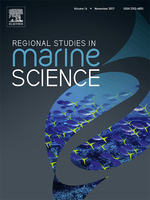
Regional Studies in Marine Science
Fostering Sustainable Practices through Marine StudiesRegional Studies in Marine Science, published by Elsevier, is a leading academic journal dedicated to advancing the understanding of marine ecosystems and their regional dynamics since its inception in 2015. With an ISSN of 2352-4855, this journal is indexed in Scopus and has achieved impressive ranking quartiles, notably Q2 in categories like Animal Science and Zoology, and Ecology, showcasing its relevance and impact in these fields. As of 2023, it ranks in the 79th percentile for Animal Science and Zoology, reflecting its significant contribution to academic discourse. While the journal operates under a traditional access model, its rigorous peer-review process ensures the publication of high-quality research that is crucial for understanding ecological interactions and fostering sustainable practices within marine environments. Researchers, professionals, and students alike will find this journal an invaluable resource for the latest findings and advancements in marine science, as it strives to bridge the gap between research and practical application at regional and global levels.
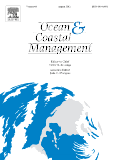
OCEAN & COASTAL MANAGEMENT
Empowering Research for Oceanic ConservationOCEAN & COASTAL MANAGEMENT is a premier journal dedicated to the multifaceted fields of oceanography, aquatic science, and coastal management. Published by ELSEVIER SCI LTD and located in the United Kingdom, this esteemed journal boasts a remarkable Q1 ranking in prestigious categories, including Aquatic Science and Oceanography, reflecting its influential contributions to the field since its inception in 1992. The journal is recognized for its high impact, boasting a commendable presence in Scopus rankings across related disciplines, with notable placements in the 94th percentile for Aquatic Science and 92nd percentile for Oceanography. Although it operates under a subscription model, OCEAN & COASTAL MANAGEMENT continues to serve as a vital resource for researchers, professionals, and students seeking to advance their understanding of coastal ecosystems and effective management strategies. Through rigorous peer-reviewed research, the journal aims to foster knowledge exchange and practical applications in policy-making and environmental stewardship, making it an essential read for anyone engaged in the preservation and sustainable use of oceanic resources.

JOURNAL OF COASTAL CONSERVATION
Uniting voices in ecology to safeguard our shores.JOURNAL OF COASTAL CONSERVATION, published by SPRINGER, is a premier academic journal dedicated to the study and promotion of coastal ecosystem management and conservation strategies. With a rich publication history beginning in 1995 and spanning over multiple converged years, this journal serves as a vital platform for researchers and professionals in the fields of Ecology, Nature and Landscape Conservation, and Oceanography. Recognized for its impactful contributions, it holds a Q2 ranking in multiple categories for 2023, including Ecology and Oceanography, underscoring its significance in advancing knowledge and practice in coastal conservation. With a commitment to delivering high-quality, peer-reviewed articles, the journal facilitates discourse on critical issues affecting coastal environments, making it an essential resource for scholars and practitioners looking to enhance the sustainability and resilience of coastal habitats. The journal provides broad access to vital research findings, ensuring that both the academic community and policy-makers have the information necessary to address the pressing challenges facing coastal regions worldwide.
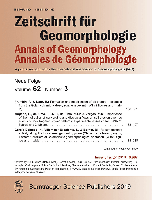
ZEITSCHRIFT FUR GEOMORPHOLOGIE
Unveiling Nature's Sculptors: The Science of Geomorphology.ZEITSCHRIFT FUR GEOMORPHOLOGIE is a prestigious journal dedicated to the field of geomorphology, published by GEBRUDER BORNTRAEGER from Germany. With the ISSN 0372-8854 and E-ISSN 1864-1687, this journal serves as a vital platform for researchers, professionals, and students interested in understanding the dynamic processes that shape our Earth’s surface. The journal has consistently maintained a solid academic reputation, achieving a Q3 ranking in key categories including Earth and Planetary Sciences (miscellaneous), Earth-Surface Processes, and Geography, Planning and Development as of 2023. This reflects its position within the global scientific community; ranked at #93 out of 179 in Earth-Surface Processes, contributing to crucial discussions surrounding environmental changes and landform evolution. Although ZEITSCHRIFT FUR GEOMORPHOLOGIE is not an Open Access publication, it offers extensive insights and findings from converged years spanning from 1979 to 2019 and again from 2021 to 2022. The journal is located at Johannesstr 3A, D-70176 Stuttgart, Germany, and plays a pivotal role in advancing geomorphological research that impacts natural sciences, ecology, and planning strategies worldwide.